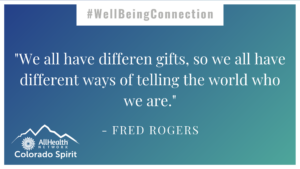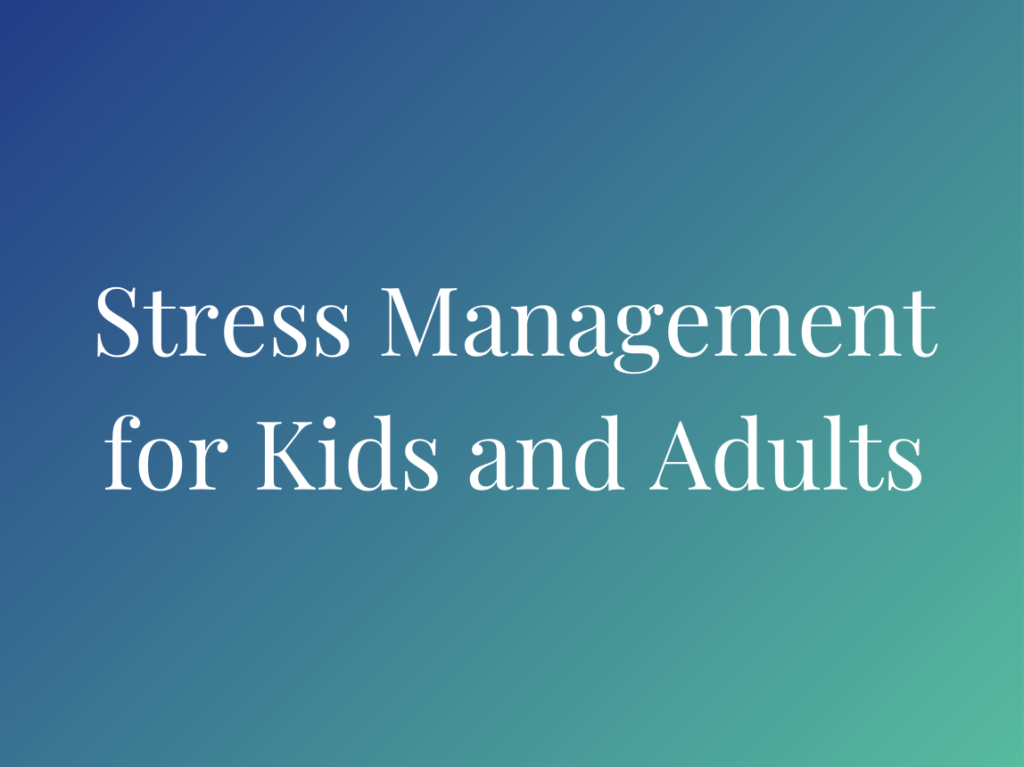This week’s post was written by Colorado Spirit Counselor, Ally Burdick. Thank you Ally!
April is National Stress Awareness Month!
Believe it or not, stress is not actually a bad thing. A little bit of stress can help us prioritize our to-do list and keep us motivated throughout the day. The problem with stress is when we have too much or allow it to build up over time and it becomes overwhelming and hard to manage.
Not only do adults experience long-term stress, but kids do too. It is important to begin practicing stress management from a young age.
The American Psychological Association emphasizes stress management for young kids and teens in response to an increase in anxiety and depression in kids in recent years. The article also highlights the common signs of stress in children and adults – increased irritability, changes in behavior, mood swings, trouble sleeping, changes in appetite or eating patterns, etc.
Kids today can be stressed about all kinds of things. Just like adults, stress can come from an overly busy schedule, stimulation and noise from electronics, family changes or conflicts, pressure to succeed, etc. Sometimes it can be hard to describe feelings and stressors – no matter what age. Actively practicing stress management techniques, especially starting at a young age, can help us better recognize our emotions and understand our own mind and body.
AllHealth Network’s Colorado Spirit team has collected three stress management activities for children and three activities for adults.
For Children:
Use Your Spidey Senses
- Spidey Senses is a mindfulness activity that focuses on using our five senses: listen, touch, look, hear, and taste. When kids practice mindfulness, their attention is brought to things around them and shifts focus away from the stressor. A general script is as follows:
- What do you see around you right now?
- What can you smell right now?
- What noises can you hear?
- What do your socks or shoes feel like on your feet?
- What foods can you taste from lunch?
- For more on this exercise, visit Our Own Kids Club.
DIY Breathing Sticks
- Breathing sticks are very useful when teaching kids how to slow down and breathe, especially in times of anger, frustration, or stress. All you need for this activity is a pipe cleaner and six beads.
- Take the pipe cleaner and bend one end so the beads do not fall off. Put on all six beads, and then bend the other end to secure the beads.
- Slowly slide one bead over to the opposite side of the breathing stick as you breathe in. Hold your breath for a few seconds.
- Slowly slide the second bead to the opposite side as you breathe out. Continue to breathe in and out and sliding beads.
- Once all six beads reach the other end of the breathing stick, repeat the exercise.
- Watch this quick video from the Momentous Institute for help on this exercise.
Feelings Charts
- Recognizing and understanding our emotions, especially in times of high stress, can be difficult. Feelings charts can help kids better identify what they are feeling and encourage them to communicate their emotions to others. You may hear the phrase “name it so you can tame it”. It is important to include feelings beyond the usual “happy”, “sad”, “angry”. Below are some other emotions to add.
- Worried
- Surprised
- Lonely
- Nervous
- For more on feelings charts and links to printable examples, visit Happier Human.
For Adults:
Mindful Nature Walk
- With spring upon us, it is a great time to try a mindful nature walk. Practicing mindfulness outside has several benefits for both our physical and mental health. To practice mindfulness on a walk, it is important to focus on the environment around you and to take breaks as you go. Mindfulness works best when we take our time. Here are a few other things to practice mindfulness on a nature walk:
- Listen to the sounds around you.
- Tune into the sunshine or breeze on your skin.
- Close your eyes and focus on any smells you may come across.
- Enjoy the silence
- Read Mindful’s article about taking a mindful hike for more.
Gratitude Jar
- Practicing gratitude everyday can positively affect our mental health and lower overall stress levels. One way we can integrate gratitude into our daily routines is a gratitude jar. All you need is a pen, small pieces or scraps of paper, and a jar (or any container you have available).
- Once a day, or more often if you want to, write down a few things you are grateful for on the bits of paper and put them in the jar.
- Repeat this process everyday adding to the jar until it fills up.
- When the jar is full, or whenever you need a pick-me-up, pull out a few notes and reflect on what you wrote.
- For more on gratitude jars, visit Mind Body Green.
2 Minute Reset
- Sometimes all we need is a few minutes to step away from the stressor to get our minds back on track. There are plenty of two-minute grounding, mindfulness, and calming exercises available that can help us better manage stress. Some examples of two-minute resets are:
- 5-4-3-2-1 Grounding
- Stretching or yoga
- Square breathing
- Dancing to your favorite song
- For more ideas for 2 minute resets, visit UNH Health & Wellness’s list of suggestions.

If speaking to someone would help, please reach out.
AllHealth Network provides several supports:
- To speak with someone in the Colorado Spirit Program about stress related to the pandemic, please call 720-707-6789 or visit our webpage at allhealthnetwork.org/Colorado-Spirit
- For information about other services at AllHealth Network or to get connected with ongoing behavioral health support, please call 303-730-8858. AllHealth Network is continuing to provide service via telehealth or by phone and our Crisis Walk-in Center remains open 24/7.
If you are experiencing a mental health crisis and are in need of immediate assistance, please call the Colorado Crisis Hotline at 1-844-493-8255 (TALK) or text TALK to 38255.
How do you know if you’re experiencing a mental health crisis? Click here to learn about mental health crisis warning signs to look out for from the National Alliance on Mental Illness (NAMI).
Be sure to follow us on Facebook to receive information about our free groups and get notifications when we post coping tips, mindfulness suggestions, and more.


